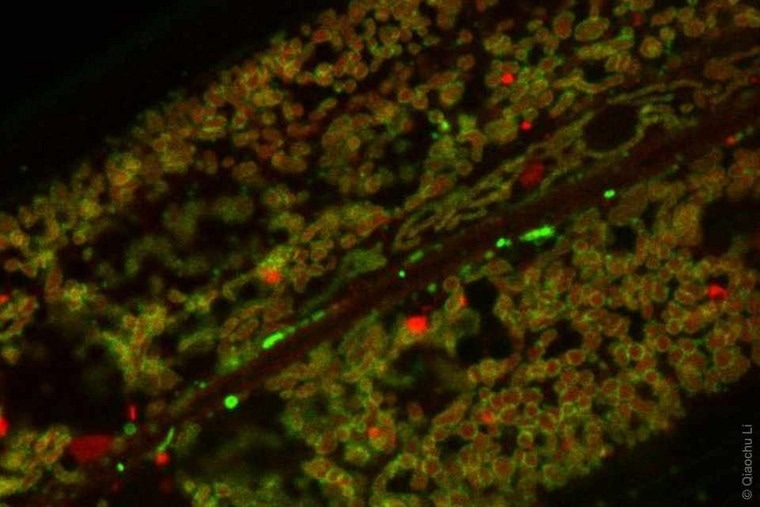Reviewed by Lauren HardakerNov 3 2025
Researchers at the University of Cologne have found that a particular dietary amino acid enhances cellular energy, thereby creating new opportunities for the treatment of metabolic disorders. The study was published in the journal Nature Cell Biology.
 The green fluorescent signal indicates the stability of mitochondrial surface proteins (marked in red). Changes in cellular nutrient levels, such as the availability of leucine, alter the signal’s intensity, reflecting the dynamic regulation of mitochondrial proteins. Disruption of this process has been linked to diseases such as cancer and infertility. Image Credit: University of Cologne
The green fluorescent signal indicates the stability of mitochondrial surface proteins (marked in red). Changes in cellular nutrient levels, such as the availability of leucine, alter the signal’s intensity, reflecting the dynamic regulation of mitochondrial proteins. Disruption of this process has been linked to diseases such as cancer and infertility. Image Credit: University of Cologne
Mitochondria are tiny organelles responsible for releasing energy essential for growth, movement, and overall health. Since mitochondria must continuously adapt their functions to satisfy the energy requirements of the cell, the energy production process is extremely flexible and is known to be influenced by the nutrients present in the cell at any specific time. Nevertheless, it has remained uncertain how these nutrients affect this adaptability.
A research team has discovered a new pathway by which the amino acid leucine improves mitochondrial function. The recent findings illustrate how leucine stabilizes essential mitochondrial proteins and increases energy production.
Leucine is an essential amino acid, so it must be obtained through dietary sources. It serves as a crucial component for protein synthesis and is present in foods high in protein, including dairy products, meats, and legumes like beans and lentils. Recent research has revealed that leucine inhibits the breakdown of certain proteins located on the surface of mitochondria. These proteins play a key role in energy production by facilitating the import of various metabolic molecules into the mitochondria. By safeguarding these proteins, leucine enhances the efficiency of mitochondrial function, thereby increasing the energy output of the cell.
We were thrilled to discover that a cell’s nutrient status, especially its leucine levels, directly impacts energy production. This mechanism enables cells to swiftly adapt to increased energy demands during periods of nutrient abundance.
Dr. Qiaochu Li, Study First Author, University of Cologne
The team also found that this regulation is facilitated by SEL1L, a protein associated with cellular quality control. SEL1L generally recognizes damaged or misfolded proteins for degradation. Leucine seems to downregulate SEL1L, thereby decreasing the degradation of mitochondrial proteins and ultimately improving mitochondrial performance.
Modulating leucine and SEL1L levels could be a strategy to boost energy production. However, it is important to proceed with caution. SEL1L also plays a crucial role in preventing the accumulation of damaged proteins, which is essential for long-term cellular health.
Dr. Qiaochu Li, Study First Author, University of Cologne
The team noted that issues in the degradation of leucine can adversely impact mitochondrial function and result in fertility challenges during their investigation into the wider implications of their discoveries, utilizing the model organism Caenorhabditis elegans.
They further found specific mutations in human lung cancer cells that influence leucine metabolism and promote the survival of these cancer cells, a crucial consideration for future cancer treatment strategies.
The study offers significant new evidence that dietary nutrients not only provide energy for the body but also play an active role in shaping energy production at the cellular level. The study highlights potential new therapeutic targets for conditions linked to compromised energy production, including cancer and metabolic disorders, by uncovering the effects of leucine on mitochondrial metabolism.
Source:
Journal reference:
Li, O., et al. (2025) Leucine inhibits degradation of outer mitochondrial membrane proteins to adapt mitochondrial respiration. Nature Cell Biology. doi.org/10.1038/s41556-025-01799-3